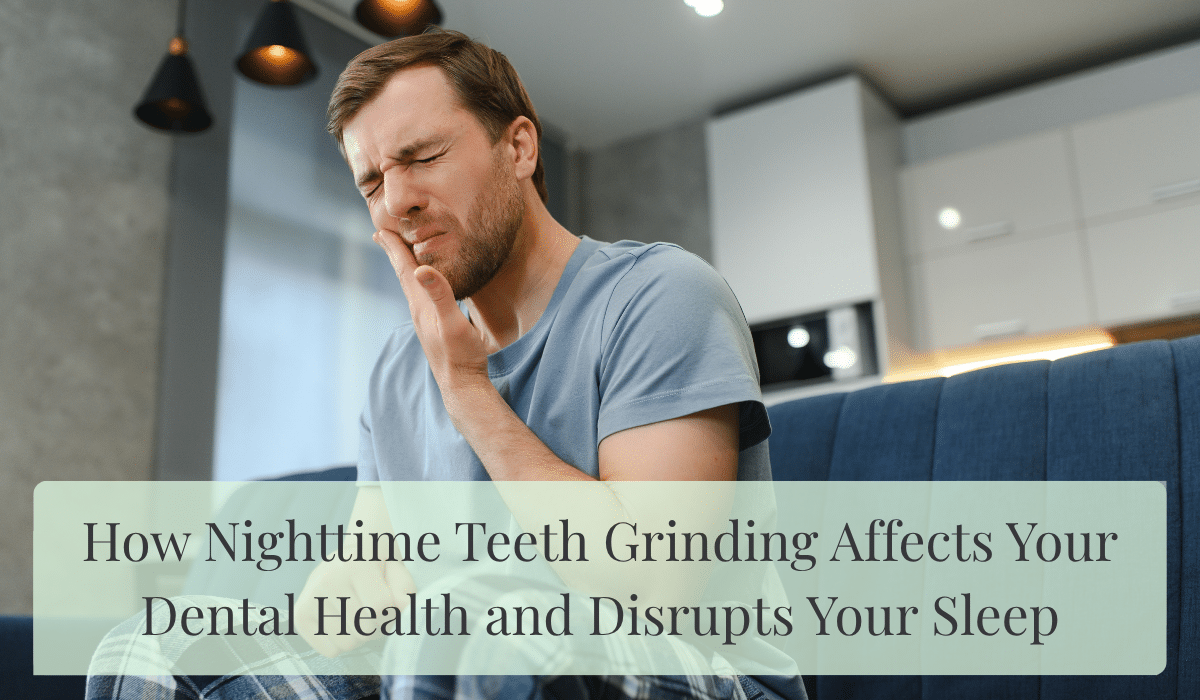Bruxism is the medical term for tooth grinding and for many people, grinding is more prevalent at night. It may not seem like a big deal, but nighttime teeth grinding not only affects your teeth, it can also negatively affect your sleep.
If you or a loved one grinds their teeth while sleeping, your trusted cosmetic dentist can restore any dental damage (chips, cracks) and help treat the underlying problem. Your sleep and your oral health may depend on it.
How Does Grinding Affect Your Teeth and Sleep at Night?
Night-time teeth grinding can have pronounced effects on your teeth and sleep. Every time you grind your teeth at night without realizing it, this is what’s happening:
- To your teeth – When you’re asleep, you may grind your teeth more severely than you would if you were awake, as there’s nothing to stop the behavior. While grinding, your jaw will clench and the muscles around your neck and head will tense up. Your teeth will press and push against each other, resulting in abrasive and compressive pressures.
- To your sleep – You may not wake up (or remember waking up) while grinding your teeth, but nighttime grinding does frequently wake people up. And even if it doesn’t, grinding can trigger brief wake ups that go undetected but still affect sleep quality.
- To your teeth – When you’re asleep, you may grind your teeth more severely than you would if you were awake, as there’s nothing to stop the behavior. While grinding, your jaw will clench and the muscles around your neck and head will tense up. Your teeth will press and push against each other, resulting in abrasive and compressive pressures.
What Are Some Signs That Your Teeth Are Affected by Nighttime Grinding?
The difficult thing about nighttime teeth grinding is that it occurs when you’re asleep and unable to notice it. However, there are signs that your teeth or sleep are suffering. Some of those signs include:
- Damage to your teeth or dental elements – Repeated grinding motions place intense biting and abrasion forces on your teeth and any dental appliances or elements attached to them. If you’ve noticed damage like chips or cracks, or if your teeth have been worn flat, it could be due to undiagnosed bruxism. And if you’ve recently had a filling pop out unexpectedly, grinding could be the culprit.
- Persistent headaches, jaw pain or facial pain – Nighttime teeth grinding also places intense stresses on your jaw, which can cause problems with your temporomandibular joints, or TMJ. These joints sit just under and in front of your ears, and if they’re affected by grinding, they may ache or produce a clicking noise.
Nighttime teeth grinding also causes tension in the neck and face, which could result in regional pain. If you’re experiencing regular, unexplained headaches, this constant tension could be why.
- Sleep apnea – Sleep apnea and bruxism often occur in tandem, with one condition making the other worse. Sleep apnea is a leading cause of frequent sleep disruptions and is a risk factor for cardiovascular disease, fatigue and various mental issues.
- Anxiety and stress – Poor sleep is a known risk factor for higher levels of stress, and nighttime teeth grinding can interfere with restorative rest. It may not be the first thing to rule out if you’re dealing with stress, but teeth grinding could be a hidden cause.
- Fatigue – Many people who suffer from repeated sleep disruptions also suffer from repeated bouts of fatigue. It’s easy to understand why, but it may not be clear that teeth grinding is behind your sleep problems and fatigue.
- Complaints from loved ones – If you’re only grinding your teeth at night, you won’t be awake to hear it, but your loved ones may, and if they’re reporting frequent grinding episodes, it’s time to speak with your dentist.
- Damage to your teeth or dental elements – Repeated grinding motions place intense biting and abrasion forces on your teeth and any dental appliances or elements attached to them. If you’ve noticed damage like chips or cracks, or if your teeth have been worn flat, it could be due to undiagnosed bruxism. And if you’ve recently had a filling pop out unexpectedly, grinding could be the culprit.
How Can a Dentist Help Prevent Teeth Grinding?
If you’re grinding your teeth at night, it’s an involuntary behavior that can only be corrected with a protective dental device or lifestyle adjustments. Both are typically recommended to optimize treatment efficacy.
Specifically, some of the treatment options your dentist recommends may include:
- Custom mouth guards – Your dentist can fabricate a custom mouth guard or splint that’s designed to fit comfortably in your mouth and protect your teeth. Dental guards are designed to bear grinding pressures instead of your teeth, essentially shielding your teeth.
- Restorative or cosmetic dentistry – If nighttime bruxism has already caused significant tooth damage, your dentist can perform repairs or replace teeth that are too badly damaged to be fixed. In this way, restorative dentistry doesn’t just restore your teeth’s appearance, it restores long-term stability and durability to your teeth.
- Lifestyle adjustments – Your dentist can prevent ongoing damage or wear to your teeth, but to stop nighttime teeth grinding completely, you may need to make some behavioral or lifestyle changes. Smoking, stimulant use and poor sleep habits are all connected to teeth grinding, and reducing their impact can also reduce the impact of grinding on your health.
- Custom mouth guards – Your dentist can fabricate a custom mouth guard or splint that’s designed to fit comfortably in your mouth and protect your teeth. Dental guards are designed to bear grinding pressures instead of your teeth, essentially shielding your teeth.
Fortunately, with the right therapies and adjustments, teeth grinding can be effectively treated with minimal difficulty.
If Treated Promptly, Your Dentist Can Correct Teeth Grinding and its Effect on Your Sleep
Nighttime teeth grinding takes a hidden health toll on patients. Most noticeably, it will cause tooth damage and accelerated wear. However, there’s also the effects on your sleep, which can be significant as well. Plenty of research shows that quality sleep is extremely important for overall health, and teeth grinding can directly interfere with that.
Thankfully there are solutions available, including dental solutions that your trusted Kingwood dentist can implement immediately and comfortably. If you’re living with frequent teeth grinding don’t wait until your teeth are beyond repair. Schedule a consultation for a total dental assessment and treatment plan for you.
A) Untreated teeth grinding can lead to an array of complications, both physical and mental. Physically, teeth grinding frequently leads to chronic pain and headaches. Mentally, it can cause stress, anxiety, and disturb your sleep.
A) A quick, effective fix is wearing a mouth guard or splint to sleep. Both are designed to redirect grinding forces away from the teeth and to the guard itself. Your dentist can fabricate a custom guard for maximum comfort and effectiveness.
A) Nighttime teeth grinding may alleviate eventually, but only if the underlying cause is also temporary. If you’re dealing with chronic stress or other chronic sleep issues, you’ll likely need to treat your teeth grinding directly.
- How Nighttime Teeth Grinding Affects Your Dental Health and Disrupts Your Sleep - November 10, 2025



